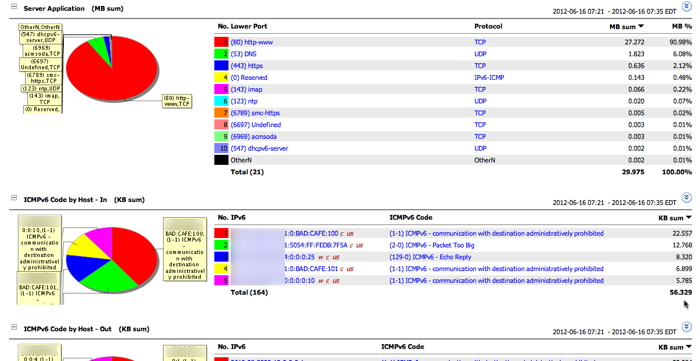IPv6: 1. Introduction
Posted: Fri Jul 13, 2012 4:48 am
As we are all aware, the Internet has experienced an unprecedented surge in usage, particularly in recent years. This growth has been fueled by the widespread adoption of mobile technologies and other devices, enabling people to access the World Wide Web and various online services seamlessly.
Until now, every computer connected to the Internet has relied on Internet Protocol 4 (IPv4) for routing and packet switching. However, the exponential increase in the number of connected devices has quickly depleted the available IPv4 addresses. To address this issue, Internet Protocol Version 6 (IPv6) has emerged as the next-generation protocol, offering several significant advantages over its predecessor.
Enter CySight—an advanced solution that delivers highly scalable and granular network traffic analysis, coupled with intelligent intrusion detection capabilities that can identify abnormal traffic flows for both IPv4 and IPv6.
CySight stands as a fully IPv6-compliant platform, encompassing comprehensive monitoring, alerting, and reporting functionalities:
CySight boasts extensive support for all Flow versions, including v5, v7, and v9, as well as IPFIX, sFlow, ixflow, jFlow, NetStream, VMWare, and Flexible NetFlow.
In addition, CySight empowers organizations with complete IPv6 business groupings, ensuring full compliance with Netflow IPv6 analytics. This comprehensive approach covers cyber security network, cloud and 5G anomaly detection, usage billing, 95th percentile billing, report scheduling, alerting, user portals, and many other essential features. To learn more about IPv6 business groupings.
Are you searching for an all-in-one Netflow analyzer that ticks all the boxes? Look no further. Simply download and register here and see for yourself why CySight scales well beyond any other Flow analyzer and DPI packet analytics.

In contrast to IPv4, which utilizes 32-bit addresses, IPv6 boasts an impressive 128-bit address space. This expanded address space revolutionizes the way we allocate unique identifiers to devices and networks.
IPv6 addresses are classified into various types, each serving specific purposes in major addressing and routing methodologies. These types include unicast, multicast, and anycast networking. Within each category, specific address formats are recognized, dividing the 128 address bits into groups and establishing rules for associating these groups with special addressing features.
Let's explore the remarkable benefits of IPv6:
Until now, every computer connected to the Internet has relied on Internet Protocol 4 (IPv4) for routing and packet switching. However, the exponential increase in the number of connected devices has quickly depleted the available IPv4 addresses. To address this issue, Internet Protocol Version 6 (IPv6) has emerged as the next-generation protocol, offering several significant advantages over its predecessor.
Enter CySight—an advanced solution that delivers highly scalable and granular network traffic analysis, coupled with intelligent intrusion detection capabilities that can identify abnormal traffic flows for both IPv4 and IPv6.
CySight stands as a fully IPv6-compliant platform, encompassing comprehensive monitoring, alerting, and reporting functionalities:
- Alert and analyze IPv6 network issues
- Perform early intelligent baselining enhancing behavior anomaly detection to identify network intrusion attempts
- Effectively mitigate IPv6 Denial-of-Service (DoS) attacks
- Enable Service Level Monitoring and Billing of IPv6 network usage
- Provide a robust framework for testing, debugging, and implementing IPv6
- Offers extensive recording, logging, and replaying capabilities for analyzing IPv6 network traffic behavior
- Enables complete collection of all IPv6 traffic flows and generate insightful reports on IPv6 network statistics.
CySight boasts extensive support for all Flow versions, including v5, v7, and v9, as well as IPFIX, sFlow, ixflow, jFlow, NetStream, VMWare, and Flexible NetFlow.
In addition, CySight empowers organizations with complete IPv6 business groupings, ensuring full compliance with Netflow IPv6 analytics. This comprehensive approach covers cyber security network, cloud and 5G anomaly detection, usage billing, 95th percentile billing, report scheduling, alerting, user portals, and many other essential features. To learn more about IPv6 business groupings.
Are you searching for an all-in-one Netflow analyzer that ticks all the boxes? Look no further. Simply download and register here and see for yourself why CySight scales well beyond any other Flow analyzer and DPI packet analytics.

In contrast to IPv4, which utilizes 32-bit addresses, IPv6 boasts an impressive 128-bit address space. This expanded address space revolutionizes the way we allocate unique identifiers to devices and networks.
IPv6 addresses are classified into various types, each serving specific purposes in major addressing and routing methodologies. These types include unicast, multicast, and anycast networking. Within each category, specific address formats are recognized, dividing the 128 address bits into groups and establishing rules for associating these groups with special addressing features.
Let's explore the remarkable benefits of IPv6:
- Increased address space - This expansion allows the Internet to accommodate an enormous number of devices by providing a significantly larger pool of available addresses.
- More efficient routing - IPv6 facilitates stateless auto-reconfiguration of hosts, resulting in streamlined routing processes.
- Reduced management requirement - IPv6 introduces improvements in managing quality-of-service, meeting the demands of modern applications.
- Multi-Homing and Better mobility support - IPv6 ensures transport layer connection survivability, enabling seamless reachability for mobile devices, regardless of their location.
- Security - IPv6 introduces various address scopes, including link-local, site-local, and global address space, enabling efficient network management and addressing requirements.
- Scoped address - link-local, site-local and global-address space